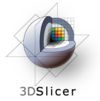Engineering:Isomics
Back to NA-MIC Engineering
Overview of Isomics Projects (PI: Steve Pieper)
At Isomics, we are responsible for the end-user application software that serves as vehicle for translating algorithms and engineering infrastructure directly into the hands biological scientists. Primary effort goes into the 3D Slicer software, the reference implementation of NA-MIC Kit technologies. In close collaboration with our Engineering Core colleagues and cooperative development with other NIH funded efforts, we work to provide usable, documented, and efficient application software that enables world class science.
Isomics Projects

|
3D SlicerThe 3D Slicer platform has been completely reworked through the joint efforts of the NA-MIC community and the NAC, NCIGT, and other cooperative grants that leverage the common infrastructure. Isomics is pleased to serve as the chief architects and major implementers of this package. In this role, we help coordinate group development activities to ensure interoperability and cross platform support. More... |
The Neuroimaging Tools and Resources Clearinghouse (NITRC)Isomics has taken the lead in NA-MIC interactions with our sister effort at NITRC. Where NA-MIC provides algorithms and software infrastructure, NITRC is dedicated to hosting an active community of neuroimaging researchers and supporting them with information and well structured access to software tools. This productive collaboration is resulting in the development of a [https://www.slicer.org/wiki/Slicer3:Loadable_Modules loadable module infrastructure] for the Slicer3 platform through which dedicated neuroimaging modules can have a project-focused web presence using NITRC, while integrating tightly with the Slicer3 application for usability. More... | |

|
Finite Element Meshing from Image SegmentationsFunded through the NCBC collaboration grant mechanism, this projects brings together researchers at Isomics and University of Iowa to create a fully open source pipeline to go from CT scanned cadaver hands to high quality finite element meshes to support biomechanical research. More...
|

|
PAR-07-249: R01CA131718 NA-MIC Virtual ColonoscopyThis project is funded under an NCBC collaboration grant to PI Hiroyuki Yoshida. The goal of this project is to More... |

|
Outreach and Collaboration EffortsAs Co-PI for the NA-MIC Dissemination Core in addition to his engineering role, Dr. Pieper serves as the engineering contact for many external contacts with groups that may benefit from NA-MIC technology development. Productive technical interchanges are actively underway with a diverse group of sites and in an wide variety of application areas. These include pediatric cardiology research with Boston Children's Hospital and University of Utah; radiation treatment planning research with Massachusetts General Hospital; vascular modeling with the Mario Negri Institute; whole-body segmentation with Washington University, St. Louis, and Stanford University; surgical robotics with Johns Hopkins University and the Japanese government; microscopy image analysis with UCSD and Ohio State; cardiovascular image informatics with Johns Hopkins University; biomechanical simulation of blast dynamics with MIT and the US Army. Isomics Personnel Activities
|
